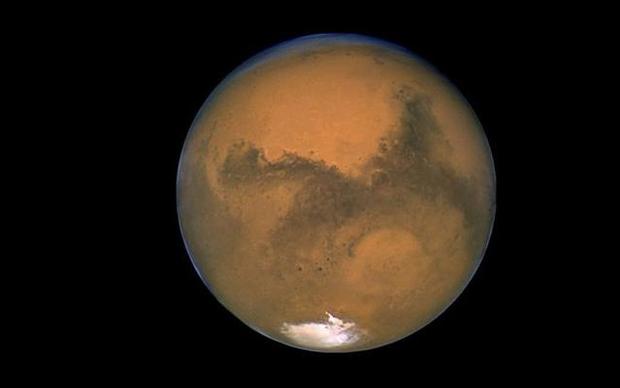Suddenly, Lots of Talk About One-Way Missions to Space
Suddenly, the idea of sending humans on one-way flights to colonize other planets is getting a public airing.
Just last weekend, NASA Ames Director Simon "Pete" Worden was quoted as saying that NASA has "just started a project with DARPA" called the Hundred Year Starship with the long-range goal of settling other planets. (DARPA is an acronym for the Defense Advanced Research Projects Agency.)
The general idea would be to send humans to destinations where they would live out the remainder of their lives.
And now, a couple of researchers make the argument why the use of one-way tickets to the cosmos would be the preferred - not to mention the most affordable - way to establish human colonies on other worlds..
In a paper published in the Journal of Cosmology, Dirk Schulze-Makuch, an associate professor at Washington State University's School of Earth and Environmental Sciences and Paul Davies, a physicist and cosmologist from Arizona State University, say the costs of safely returning a crew would eat up the lion's share of the mission's budget.
"We envision that Mars exploration would begin and proceed for a long time on the basis of outbound journeys only," they write, adding that a Mars mission to Mars could exploit hardware technologies developed for the Moon program. "One approach could be to send four astronauts initially, two on each of two space craft, each with a lander and sufficient supplies, to stake a single outpost on Mars. A one-way human mission to Mars would be the first step in establishing a permanent human presence on the planet."
The rationale for a mission to Mars? Species preservation.
"We are a vulnerable species living in a part of the galaxy where cosmic events such as major asteroid and comet impacts and supernova explosions pose a significant threat to life on Earth, especially to human life. There are also more immediate threats to our culture, if not our survival as a species. These include global pandemics, nuclear or biological warfare, runaway global warming, sudden ecological collapse and supervolcanoes Thus, the colonization of other worlds is a must if the human species is to survive for the long term."
Their proposed scenario for the arrival of humans on Mars would first feature the insertion of robotic probes to set up an adequate energy source - they suggest a small nuclear reactor augmented by solar panels - as well as stockpiles of food tp provide the team with a couple of years. Also to be packed in with the first drop: "the basics for creating home-grown agriculture, one or more rover vehicles and a tool-kit for carrying out essential engineering and maintenance work."
How much NASA buys into the idea of one-way missions to Mars (and beyond) is less clear.
Although NASA was unable to verify the accuracy of Worden's comments, the report seemed to suggest that the idea of one-way manned missions is receiving serious attention within the nation's space agency. (NASA and several other space agencies have been studying plans to launch a Mars mission that would return soil samples to Earth.)
Reports of Worden's talk was first reported last week by Kurzweil Blog. He was speaking at an event in San Francisco.
You heard it here," Worden is quoted as saying. "We also hope to inveigle some billionaires to form a Hundred Year Starship fund."
"The human space program is now really aimed at settling other worlds. Twenty years ago you had to whisper that in dark bars and get fired."
According to the blog post, he went onto add that he expects humans to reach the moons of Mars by around the year 2030. At this point, though, he didn't have many details to fill in the bigger picture.
"How do you live in another world? I don't have the slightest idea," he said. "If you're a conservative, you worry about it killing us; if you're a liberal, you worry about us killing it. I think things like synthetic biology have lot of potential for that. I think rather than make an environment on Mars like Earth, why don't we modify life ... including the human genome ... so it's better suited to [Mars]?"
(Google co-founder) Larry [Page] asked me a couple weeks ago how much it would cost to send people one way to Mars and I told him $10 billion, and his response was, 'Can you get it down to 1 or 2 billion?' So now we're starting to get a little argument over the price."
DARPA subsequently issued a statement to CBSNews.com confirmed that it was working on a joint study with NASA Ames to explore the potential of developing "breakthrough technologies" that would be needed for long-duration space missions.
"A key element of the study is exploring models by which sustained co-investment by the private sector in these areas can be incentivized. The study is currently in the early formulation stage, but will be entirely open and unclassified, with more details forthcoming in early 2011."
